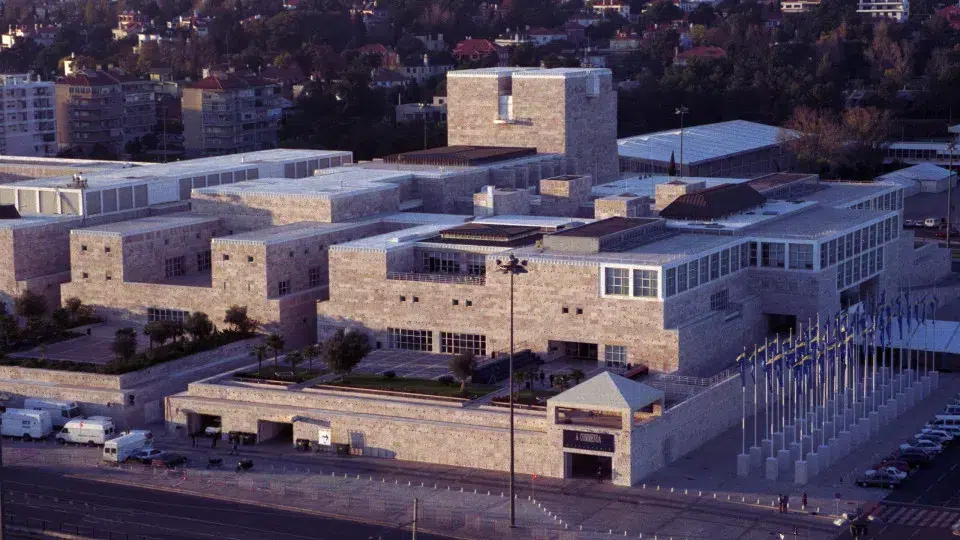
Directed by João Brites, ‘Agustinópolis,’ described as a “theatre-opera” by the director, is a creation of O Bando and the Associação Setúbal Voz. The composition and musical direction are by Jorge Salgueiro, with dramaturgy and directorial assistance from Miguel Jesus.
The work is the result of an invitation extended to João Brites by Mónica Baldaque, from the Organizing Committee for the Centennial of Agustina Bessa-Luís (1922-2019), an author, painter, museologist, and daughter of the writer of ‘A Sibila,’ who was born, like O Bando, on October 15.
Featuring as many characters as the years the author lived, in a “symbolic” exercise as described by João Brites to Lusa, the piece is constructed entirely from words extracted from Agustina’s works, following the usual practice of the Palmela-based company in literary texts, and can be defined as the creation of a city populated by an “inventory of characters” from the author born in Vila Meã.
The project developed by João Brites received literary and dramaturgical support from director João Luiz and essayist, literary critic, and dramaturge Maria João Reynaud, as the “density” of characters from works such as ‘O Vale Abraão,’ ‘O Manto,’ and ‘O Sermão do Fogo,’ was discovered.
“The characters are all controversial, dialectical, contradictory,” noted João Brites, who constructed the spectacle around the “secret of this diversity [of characters] that represent humanity,” acknowledging that reading Agustina for the show was “a revelation.”
The “great density” of the characters, from an author “who is difficult to read, being much more corrosive and perverse than likable,” inspired the director to stage a show “about today’s world and what is happening globally.”
João Brites refers to “the aspect of war and cataclysm.” Thus, in a setting characterized by a large ziggurat, symbolizing the primordial structures of Sumerian civilization built as temples linking human to divine, where metallic objects are manipulated by the actors into various forms, the play’s action is marked by conflicts and disputes between characters, including tremors and successive aftershocks, always intensifying.
Ultimately in ‘Agustinópolis,’ only beetles remain—because “they are among the most resilient animals, even to nuclear,” stated João Brites, stressing that “it seems there must be a certain regression, facing a terrible situation,” like in Saramago’s ‘Blindness’ to “rethink ourselves.”
“It seems we need new learning to relativize what motivates us. Here it is a kind of regression of humanity to a point where coexistence is questioned, akin to a Greek chorus reference,” emphasized the director.
Otherwise, “it’s a continuation into barbarism,” which appears never-ending. Additionally, “perhaps, we need to slightly review what democracy is.” “Review and rethink it,” he stressed, highlighting that often humans forget “they are creatures where every cell is fighting for survival.”
When asked about the choice of the title ‘Agustinópolis,’ João Brites explained that “it’s immediate to think these characters are all in Agustina’s mind: ‘It’s a city of Agustina, existing in her mind, and they [the characters] emerge from there.'”
A city “that we can see reflected today” and where it becomes evident that Agustina is not merely a “regional writer,” as some believed. “When we read and gradually understand, we realize her universal dimension.”
Olímpia, Celsa, Margot, Patrícia, Francisca, Aida, Touro, and Tristão are counted among the characters of the author featured in ‘Agustinópolis,’ where action and tension build simultaneously with musical beats in an imperceptible cacophony as characters drift.
“Times have changed. It’s too soon. It’s already late,” are lines sung near the play’s end, also stating: “What impresses the masses most is death. Death of a person. Death of a society. Death of the world.”
When asked to define the performance, whose scenic and visual narrative is of solitude, which “can occur after the cataclysm, confronting the void with death,” João Brites responded: “Perhaps we are what we never acknowledged being.”
“With death, we are always alone. Facing death, even if accompanied, it is our being that fades,” he concluded.
The show concludes with an antithesis: after chaos, lyrical singing, and silence, a female character sings a capella “And only love can reveal the meeting of things and beings.”
‘Agustinópolis,’ part of the conclusion of O Bando’s 50th-anniversary celebrations, founded on October 15, 1974, will be performed at the CCB Grand Auditorium on Friday at 20:00, Saturday at 19:00, and Sunday at 17:00.
From the 24th to the 26th of this month, it will show at the Fórum Municipal Luísa Todi in Setúbal, and from October 30 to November 2 at the Teatro Nacional S. João in Porto. On November 22, it will be performed at the Centro Cultural Vila Flor in Guimarães.
With scenography and physicality by Iolanda Rodrigues, costume and prop design and execution by Catarina Fernandes, setup and scenography direction by João Brites and Dora Sales, the piece features lighting design by João Cachulo, with sound design and operation by Miguel Lima.
Performers include Bibi Gomes, Joelle Ghazarian, Juliana Boyko, Juliana Pinho, Nicolas Brites, and São Nunes; singers include Constança Melo, Diogo Oliveira, Helena de Castro, Mariana Chaves, and Ricardo Moniz, with Tiago Mileu on piano.
The cast also includes 18 other actors and 24 members of the Coro Setúbal Voz.




